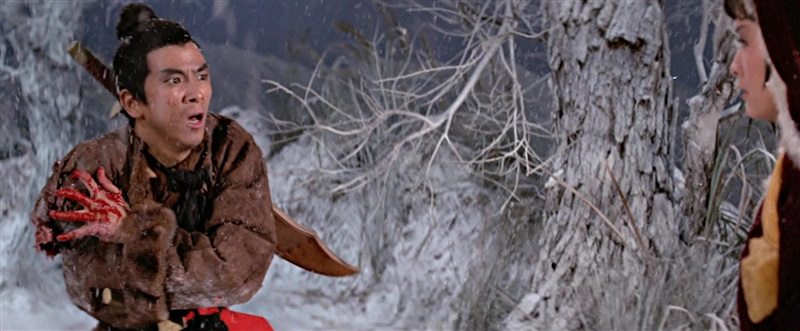Fang Gang's father served in the household of famous swordsman Qi Ru-Feng all his life and learnt his martial arts, which he puts to good use when a gang with a grievance come looking for his master. It costs him his life though, so Master Qi promises to raise his young son as if he were his own.
Flash forward a decade or two and in practise Fang Gang is looked down upon by Qi's other students because his father was a lowly servant, despite the fact his skills are superior to any of theirs. Even Master Qi's daughter Pei-Er looks down on Fang and treats him unkindly, though we suspect her true feelings may be a little more complicated. Things escalate, and Fang ends up losing his sword arm.
ONE-ARMED SWORDSMAN is one of the most influential martial arts films of all time, with a classic story and dramatic direction from Chang Cheh. It is one of the pillars of the wuxia genre, along with Come Drink With Me, and turned both Chang and Jimmy Wang Yu into Shaw Brothers' hottest property.
The film offers offers quite a bleak view of the Jiang Hu, with the quest for fame and glory mostly bringing doom to those who get caught up in it, and the arrogance of noble martial heroes being revealed as folly in the face of a more humble opponent. People look down on Fang even more when he has only one arm, but he trains that arm to levels they can't even imagine.
The action in the film looks primitive compared to films from even a few years later but it was considered innovative at the time, featuring more visceral combat and dynamic hand held camera work that was fresh and thrilling compared to the more choreographed fights derived from Chinese opera performances. If COME DRINK WITH ME is the Ying of wuxia, elegant and refined, then ONE-ARMED SWORDSMAN is the Yang, a more violent and masculine vision of the genre... a direction Chang Cheh would continue exploring for the rest of his career.

When Tsui Hark had a new vision of the Jiang Hu he wanted to present he turned to ONE-ARMED SWORDSMAN for inspiration, remaking it as The Blade and taking the bleak tone and gritty violence even further. It is a vastly superior film, but it did have the benefit of nearly three decades of innovation and refinement to draw upon as well.
I first saw this at a film festival with an audience evidently more used to the cheap and cheesy end of martial arts cinema, who spent much of the first half laughing at the dated acting before eventually realising it was actually a good film and settling down to take it more seriously. It is a very different experience to Chang Cheh's later films - even the good ones like The Five Venoms.
One of the must-see Shaw Brothers films.